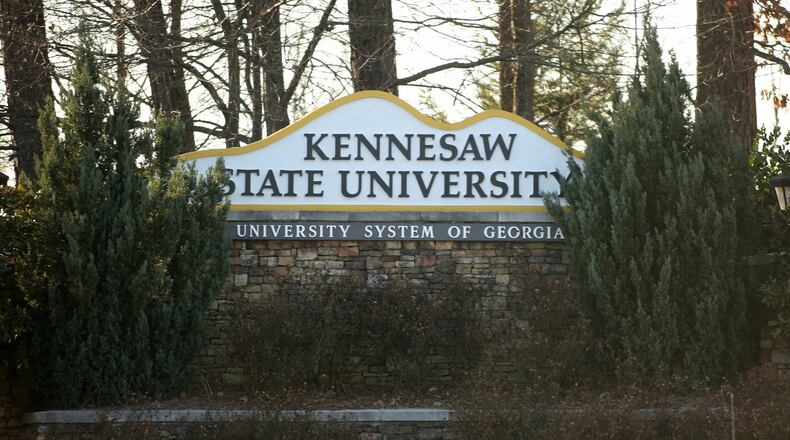Georgia considers payday loans so hazardous to borrowers that they’re banned within state lines. U.S. military officers testified before state lawmakers that the high interest, short-term paycheck advances drown sailors and soldiers in debt. At one point, the U.S. Consumer Financial Protection Bureau, a federal consumer watchdog agency, planned a crackdown.
So when a Kennesaw State University study concluded that borrowers who take out a long string of payday loans fare better than those who don't, industry advocates used it to fight off the planned crackdown. A Washington, D.C., lobbyist hand-delivered the report to a key administrator with the federal agency days before its public release, recently-released KSU emails show.
This was no ordinary academic study. The Consumer Credit Research Foundation, a group run by a payday loan industry backer, gave KSU $30,000 for the research, payable upon completion of the paper, according to a consulting agreement obtained by The Atlanta Journal-Constitution.
The foundation sought out a KSU professor who had never published research on the subject, overlooking experts who have studied payday lending’s impact on consumers for years. It directed her approach, selected the data, and at one point, asked her to re-do her work, according to the consulting contract and other records.
"What's so egregious in this case is it's not just that payday lenders paid for the study, it's that they actually wrote the study," said Daniel Stevens, executive director for the Campaign for Accountability, which has complained about the industry's attempts to influence scholarly research for years. The Washington, D.C., nonprofit released more than 400 pages of internal KSU emails about the December 2014 study in recent weeks, after fighting a three-year legal battle to obtain the public records that went to the Georgia Supreme Court.
The KSU study shows how private industry can use scholarly research to bring unearned credibility to a contentious and even questionable cause. Universities are essential to regulators, lawmakers and the public because their studies are thought to be free of outside influence.
Yet time and again, industries manage to influence scholars’ work to boost their bottom lines and thwart attempts to regulate them. The tobacco industry famously did so for decades. More recently, protests from experts forced the closure of a Coca-Cola-backed nonprofit that downplayed the role of sugary sodas in obesity. Industry influence has become such a problem that the National Institutes of Health, the nation’s medical research agency, tightened its rules on private sponsorship of research in 2018.
Despite these public controversies, KSU rules allow for an interest group to commission a study in exchange for a consulting fee, payable to its nonprofit research foundation, the AJC found. Its rules caution faculty against using their positions for personal gain, but does not address how the integrity of scholarship should be safeguarded when a group or business is paying the university.
Reviews by KSU’s Office of Research and Division of Legal Affairs that took place before professor Jennifer Lewis Priestley began her research found it violated none of it or the University System of Georgia’s ethics or legal rules, a school spokeswoman said.
“Dr. Priestley’s research was in compliance with KSU and USG policies, the source of the funding was disclosed publicly and Dr. Priestley affirms through a conflict of interest statement that the work is her own,” KSU spokeswoman Tammy Demel said in a statement. “Based on these circumstances, there has been no reason to conduct a review of the engagement.”
Priestley, a professor of statistics and data sciences, declined comment to the AJC, but acknowledged she knew little about payday lending in a recent interview with The Washington Post.
“If you had asked me what a payday loan was, I am not sure I could have explained it, but I do know a lot about math,” Priestley said.
The study required Priestley to analyze borrowers who rolled over payday loans and determine how that behavior effected their credit scores.
Priestley told the Post she saw the research as an opportunity for two of her students to perform interesting data work, and said her calculations were not manipulated to serve a point of view.
“The math is what is important here,” she told the Post. “Mathematically, I was pretty proud of the work.”
Consumer Credit Research Chairman Hilary Miller, who commissioned the research, did not return phone calls.
Academic consulting contracts
Ethics policies at many large research institutions such as Emory University, Georgia Tech and the University of Georgia require that certain researchers disclose financial interests that could sway them to change the outcome of their scholarship. Researchers who receive federal research dollars must follow rules designed to promote objectivity.
Georgia’s university system warns employees to avoid perceived and actual conflicts of interest, but allows its schools to set their own policies and does not address improper industry influence directly. At KSU, the purpose of what is now called the Graduate College’s Center for Statistics and Analytical Research is to sell the services of its researchers to private businesses and other clients.
From 2014 to 2018, the center generated more than $250,000 in income from outside consulting, a payment ledger shows. The consumer credit foundation’s payment was the largest for sales and services the center received during those years.
Priestley, an associate dean who often analyzes large sets of data for businesses, posted her paper December 2014 to a database widely used to share early-stage social science research. Although she disclosed that the payday lending group provided financial support on its front page, she failed to reveal that it hired her to write the report.
“This research was supported by a grant from Consumer Credit Research Foundation,” the paper said. “The Foundation did not exercise any control over the methodology or analysis used in this study or over the editorial content of this paper.”
This disclosure was incorrect, based on KSU’s contract and and interviews with experts on ethics in scholarship.
Grants for academic research are nothing like consulting contracts, said Tufts University professor Sheldon Krimsky, an expert in conflicts of interest and industry influence in science research. In the former, a researcher proposes a project to a funder, who can take it or leave it. If a funder provides a grant, it is expected to allow the researcher to work autonomously, he said.
“It doesn’t specify the end product,” Krimsky said. “It doesn’t stipulate how you’re going to do it.”
Even when universities have comprehensive ethics policies, researchers usually do a poor job of policing themselves, said University of Georgia education professor Sheila Slaughter, who has written about the growth of private industry’s influence over research.
“That and a dime won’t get you a cup of coffee anymore,” said Slaughter. “Nobody monitors it. Nobody looks at it.”
KSU’s paper sent to regulators
As Priestley worked on the study, foundation chairman Hilary Miller acted as her client, top expert and writing coach, KSU records show. Her contract with the payday loan group required her to focus on consumers who take out a string of two-week payday loans, rolling the balance into a new loan when it’s due.
The fees on these repeat transactions are so expensive that even payday lenders warn against using them to carry debt long term. Typical annual percentage rates approach 400 percent, according to the CFPB, which means that paying off a $400 debt over a year can cost well over $1,000.
Miller gave Priestley use of the foundation’s proprietary data set, determined what type of credit score she would use to judge consumer welfare, and required that she deliver a five-part paper that would resemble one he provided for her reference.
Priestley made sure Miller knew that she aimed to keep her client happy, according to emails exchanged from October 2013 to January 2015.
“I am here to serve,” one of her emails to Miller said. “I just want to make sure that what I am doing analytically is reflecting your thinking.”
Priestley submitted drafts of the paper to Miller, who in emails with the professor described those advocating for more payday lending restrictions as “our antagonists.” He advised her to write the paper to counter their arguments.
“You need to set the paper up better,” he wrote. “It needs to start with a bang. It now starts with kind of a thud.”
“Punctuation and capitalization are somewhat random,” Miller wrote in another email. “You might want to have your maiden aunt who went to high school before 1960 read this.”
At one point, the payday lending advocate wrote a draft of the paper’s abstract. Key portions of Miller’s edits remained in the final version, which said that repeat rollovers of payday loans over a long period of time improve a borrower’s financial health.
The paper’s conclusion: More research must be done before the federal consumer agency imposes new rules.
“This is a terrific paper. When it is done, you are going to be famous and your phone will ring off the hook,” Miller wrote to Priestley in 2014 when the report was completed. He passed it off to a lobbyist, who handed it directly to an associate director with the consumer agency, an email said.
“The package has been delivered,” Miller joked. He wrote that he planned to discuss the paper with the federal regulator’s lead economist on payday lending later that week.
The research was never published in a peer-reviewed journal, a process that ensures a study's quality. Still, KSU coordinated with Priestley and the payday lending foundation to promote it in a press release that announced "Payday Loan Rollovers Do Not Harm Borrowers' Financial Welfare." Whether it influenced regulators is unclear, but the debate over payday loans continued.
In 2017, the federal regulator decided to tighten payday lending restrictions through rules that were supposed to take effect later this year.
But in February, the agency said it would roll those plans back.
More research needed to be done, the agency said in its announcement.
About the story
A three-year battle in the Georgia courts resulted in the release of emails that became the basis of this story. In 2015, the Consumer Credit Research Foundation sued to keep from public view more than 400 pages of emails between its chairman and a Kennesaw State University professor it commissioned to research payday lending. The Campaign for Accountability, a Washington, D.C., watchdog group, had requested them under Georgia’s Open Records Act.
An appeals court sided with the foundation in May 2017, saying that state law prohibited the emails' release because the law does not expressly require it. But the Georgia Supreme Court handed the foundation a defeat more than a year later. Reading the open records law as the foundation suggested "would be contrary … to the English language," it ruled in June 2018.
The AJC obtained the emails from the Campaign for Accountability and acquired contracts and other records through separate requests.
About the Author
The Latest
Featured







